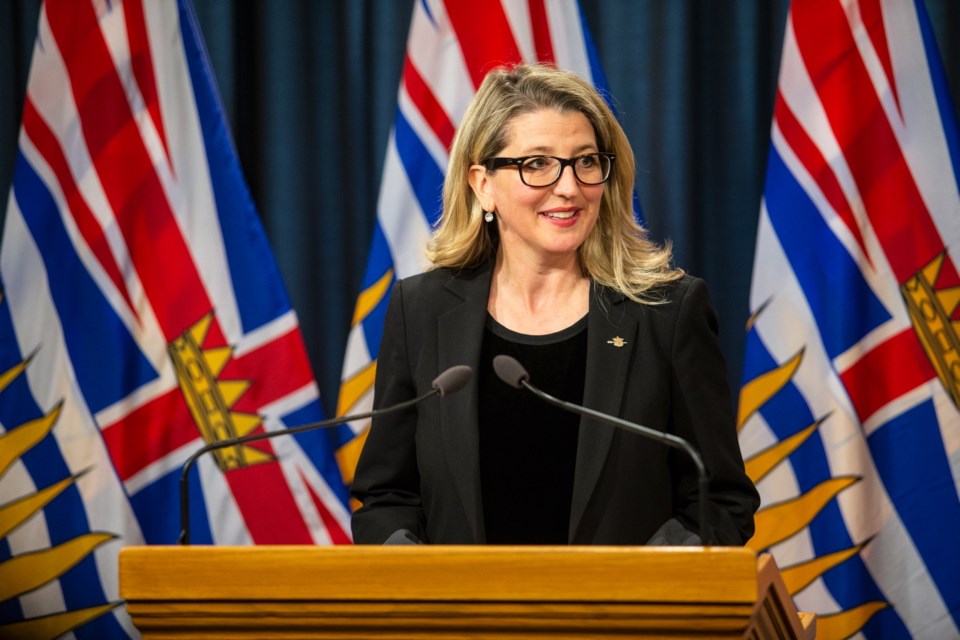 Agriculture Minister Lana Popham has been advocating the curtailment of open-net salmon farms for years. She has endorsed protests (“Thank you to all the salmon warriors out there”), delivered speeches and moved motions to that effect.
Agriculture Minister Lana Popham has been advocating the curtailment of open-net salmon farms for years. She has endorsed protests (“Thank you to all the salmon warriors out there”), delivered speeches and moved motions to that effect.
But she was noticeably reticent Wednesday, when she announced a major new policy that will set the stage for exactly that.
Four years from now, salmon farms will likely be vacating operations in the Broughton Archipelago, if they don’t give up and wind down even earlier than that.
Operations everywhere else on the coast will also have to meet stringent new conditions in order to carry on.
It will be the culmination of a campaign Popham has been involved with for years, over concern about the hotly debated impacts of the farms on wild stocks. The new policy, fully endorsed by cabinet, is a major victory for her. But if there were any high fives after she set the course, they were behind closed doors.
Because the new conditions will make investors even more skittish than they already are. The uncertainty is about the amount of decision-making power the NDP is handing over to First Nations, and how exactly the new approvals that are needed will be determined.
The upcoming requirement in 2022 on the salmon-farm companies to negotiate and obtain signed agreements with First Nations before they can get continued provincial approval for their operations gives the First Nations veto power, pure and simple.
The obvious need for consultation, because of First Nations’ profound connection to salmon, is being upgraded to a need for full consent to any government salmon-farm decisions.
Many coastal First Nations endorse salmon farms already. But around the north end of Vancouver Island, Indigenous leaders are adamantly opposed to farms, and have been for years. In 2022, their approval will be mandatory. It’s unlikely to be granted.
But Popham flatly denied that represents a veto, partly because she knows how much anxiety is out there about whether it will eventually extend to tens of thousands of other permits for resource development.
“There is no veto,” she said. “We’re looking at this as a framework to reach agreement. … If there is an agreement on the table between First Nations and a fish-farm operator, they both have the opportunity to say no to that agreement.”
That doesn’t really add up.
B.C. is actually awarding a double veto, since the Department of Fisheries and Oceans will also have to certify no harm to wild stock before any farm can renew tenures post-2022. (A 2009 court decision established the federal government has almost full authority over salmon farms.)
Popham wouldn’t say flat-out the policy would close the farms. But she did say there hasn’t been much pressure on companies to move on land and “this will force that to happen.”
She was also clear on how much stock she personally puts in the First Nations views.
“I’ve sat in the big house in the Broughton area and elders looked at us and said their freezers were bare.”
That wasn’t considered seriously before, but is now a prime consideration, she said.
The news release said the new approach will “provide good jobs.” But there are hundreds of good-paying fish-farm jobs in areas where jobs are hard to come by that don’t look nearly as secure today. The 20 operations in the Broughton region have a payroll worth several hundred million dollars.
Popham said she was referring to thousands of jobs generally in B.C. that depend on a healthy ecosystem.
As the clock ticks toward 2022, B.C. will continue the lengthy talks with north Island Indigenous leaders about salmon farms in that region. The industry, with only month-to-month authority to carry on, is going to be invited to take part in those government-to-government talks, as well.
The First Nations just won a major victory, even if they have to wait four years to seal the deal. There’s not much doubt where they stand on the issue. After Wednesday, there’s not much doubt where the B.C. government stands, either.
Wild salmon and Indigenous rights come first. Any costs in terms of jobs and investment will be dealt with later.



